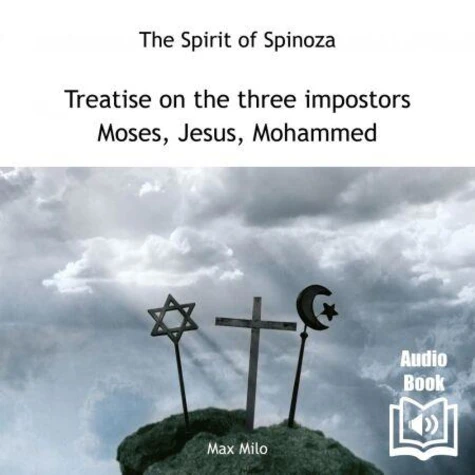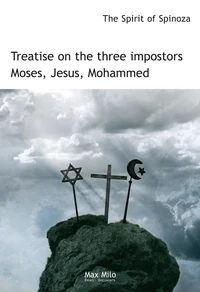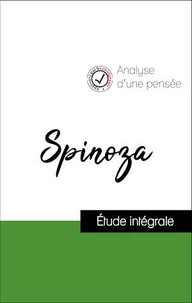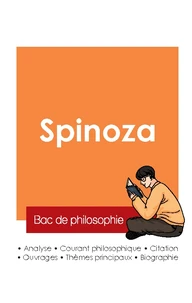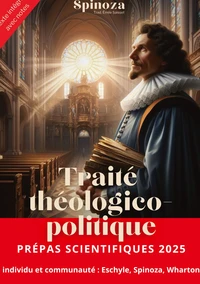Treatise on the Three Impostors: Moses, Jesus, Mohammed
Par : ,Formats :
Disponible dans votre compte client Decitre ou Furet du Nord dès validation de votre commande. Le format MP3 est :
- Pour les liseuses autres que Vivlio, vous devez utiliser le logiciel Adobe Digital Edition. Non compatible avec la lecture sur les liseuses Kindle, Remarkable et Sony
 , qui est-ce ?
, qui est-ce ?Notre partenaire de plateforme de lecture numérique où vous retrouverez l'ensemble de vos ebooks gratuitement
Pour en savoir plus sur nos ebooks, consultez notre aide en ligne ici
- FormatMP3
- ISBN978-2-315-01884-0
- EAN9782315018840
- Date de parution29/01/2024
- Protection num.pas de protection
- Taille227 Mo
- Infos supplémentairesaudio
- ÉditeurMax Milo Editions
Résumé
The Treatise on the Three Impostors was first published in 1712 under the title L'esprit de M. Benoît de Spinosa, preceded by a biography entitled La Vie de M. Benoît de Spinosa. These two works, of very dissimilar contents, have been brought together only by their common reference to Spinoza. Who is the author? This question has lost none of its relevance in three centuries. First of all, let us rule out the participation of Spinoza himself for chronological reasons, La vie de M.
Benoît de Spinosa refers to events after the philosopher's death in 1677, such as the presence of the Prince of Condé in Utrecht, "at the beginning of the last wars" in 1678. In his Dictionnaire Historique, published in The Hague in 1758, Prosper Marchand concluded that the author of L'esprit de M. Benoît de Spinosa was a certain Jan Vroesen. Marchand was a scholar, editor, bibliographer, bookseller and writer, and one of the most knowledgeable figures on the movement of ideas and authors in Northern Europe.
If we confine ourselves to this information, however, we might be embarrassed. Indeed, if he is indeed the complete and only author of L'esprit de M. Benoît de Spinosa, Vroesen must have been a very precocious man, since around 1687, Vroesen was only fifteen or sixteen years old. Until the French Revolution, literate Europe was full of memoirs, hypotheses and questions about the real author of the Treatise of the Three Impostors.
People even came to suspect Frederick II of Prussia, a notorious anticleric, of being its author. The only problem is that Frederick was born the same year that the Rotterdam edition was published.
Benoît de Spinosa refers to events after the philosopher's death in 1677, such as the presence of the Prince of Condé in Utrecht, "at the beginning of the last wars" in 1678. In his Dictionnaire Historique, published in The Hague in 1758, Prosper Marchand concluded that the author of L'esprit de M. Benoît de Spinosa was a certain Jan Vroesen. Marchand was a scholar, editor, bibliographer, bookseller and writer, and one of the most knowledgeable figures on the movement of ideas and authors in Northern Europe.
If we confine ourselves to this information, however, we might be embarrassed. Indeed, if he is indeed the complete and only author of L'esprit de M. Benoît de Spinosa, Vroesen must have been a very precocious man, since around 1687, Vroesen was only fifteen or sixteen years old. Until the French Revolution, literate Europe was full of memoirs, hypotheses and questions about the real author of the Treatise of the Three Impostors.
People even came to suspect Frederick II of Prussia, a notorious anticleric, of being its author. The only problem is that Frederick was born the same year that the Rotterdam edition was published.
The Treatise on the Three Impostors was first published in 1712 under the title L'esprit de M. Benoît de Spinosa, preceded by a biography entitled La Vie de M. Benoît de Spinosa. These two works, of very dissimilar contents, have been brought together only by their common reference to Spinoza. Who is the author? This question has lost none of its relevance in three centuries. First of all, let us rule out the participation of Spinoza himself for chronological reasons, La vie de M.
Benoît de Spinosa refers to events after the philosopher's death in 1677, such as the presence of the Prince of Condé in Utrecht, "at the beginning of the last wars" in 1678. In his Dictionnaire Historique, published in The Hague in 1758, Prosper Marchand concluded that the author of L'esprit de M. Benoît de Spinosa was a certain Jan Vroesen. Marchand was a scholar, editor, bibliographer, bookseller and writer, and one of the most knowledgeable figures on the movement of ideas and authors in Northern Europe.
If we confine ourselves to this information, however, we might be embarrassed. Indeed, if he is indeed the complete and only author of L'esprit de M. Benoît de Spinosa, Vroesen must have been a very precocious man, since around 1687, Vroesen was only fifteen or sixteen years old. Until the French Revolution, literate Europe was full of memoirs, hypotheses and questions about the real author of the Treatise of the Three Impostors.
People even came to suspect Frederick II of Prussia, a notorious anticleric, of being its author. The only problem is that Frederick was born the same year that the Rotterdam edition was published.
Benoît de Spinosa refers to events after the philosopher's death in 1677, such as the presence of the Prince of Condé in Utrecht, "at the beginning of the last wars" in 1678. In his Dictionnaire Historique, published in The Hague in 1758, Prosper Marchand concluded that the author of L'esprit de M. Benoît de Spinosa was a certain Jan Vroesen. Marchand was a scholar, editor, bibliographer, bookseller and writer, and one of the most knowledgeable figures on the movement of ideas and authors in Northern Europe.
If we confine ourselves to this information, however, we might be embarrassed. Indeed, if he is indeed the complete and only author of L'esprit de M. Benoît de Spinosa, Vroesen must have been a very precocious man, since around 1687, Vroesen was only fifteen or sixteen years old. Until the French Revolution, literate Europe was full of memoirs, hypotheses and questions about the real author of the Treatise of the Three Impostors.
People even came to suspect Frederick II of Prussia, a notorious anticleric, of being its author. The only problem is that Frederick was born the same year that the Rotterdam edition was published.

